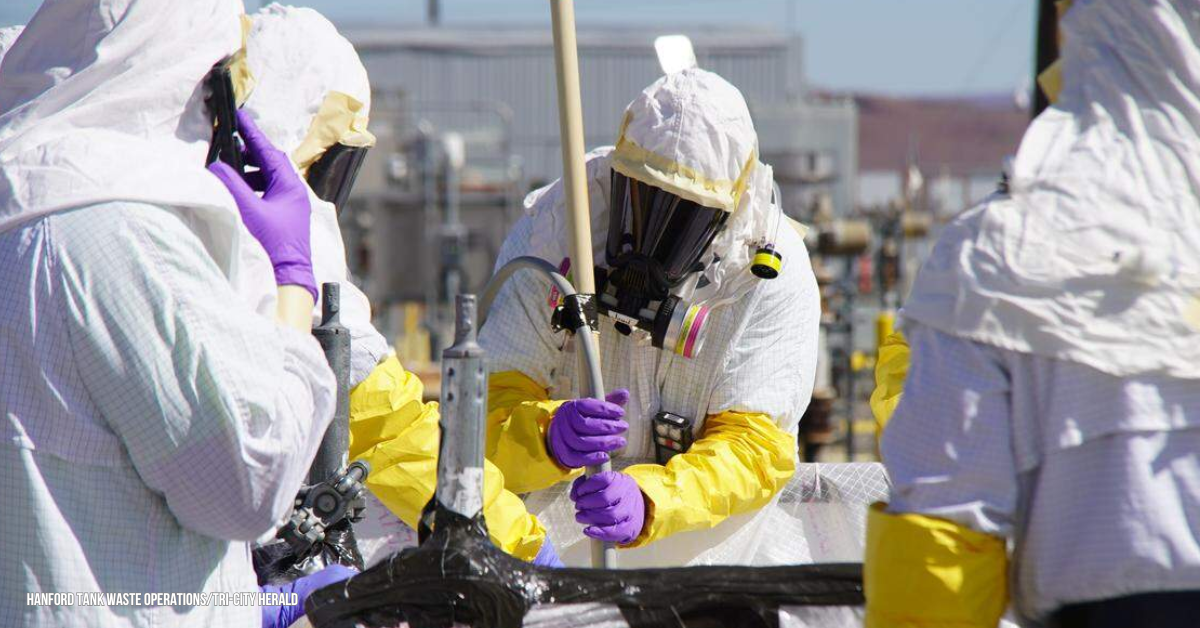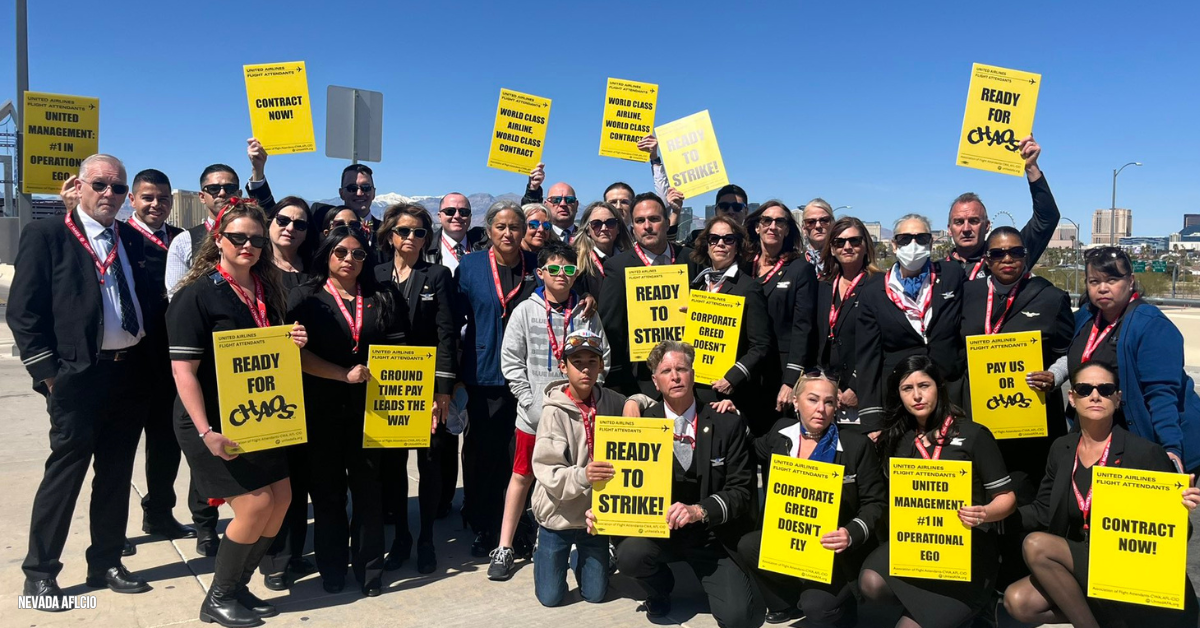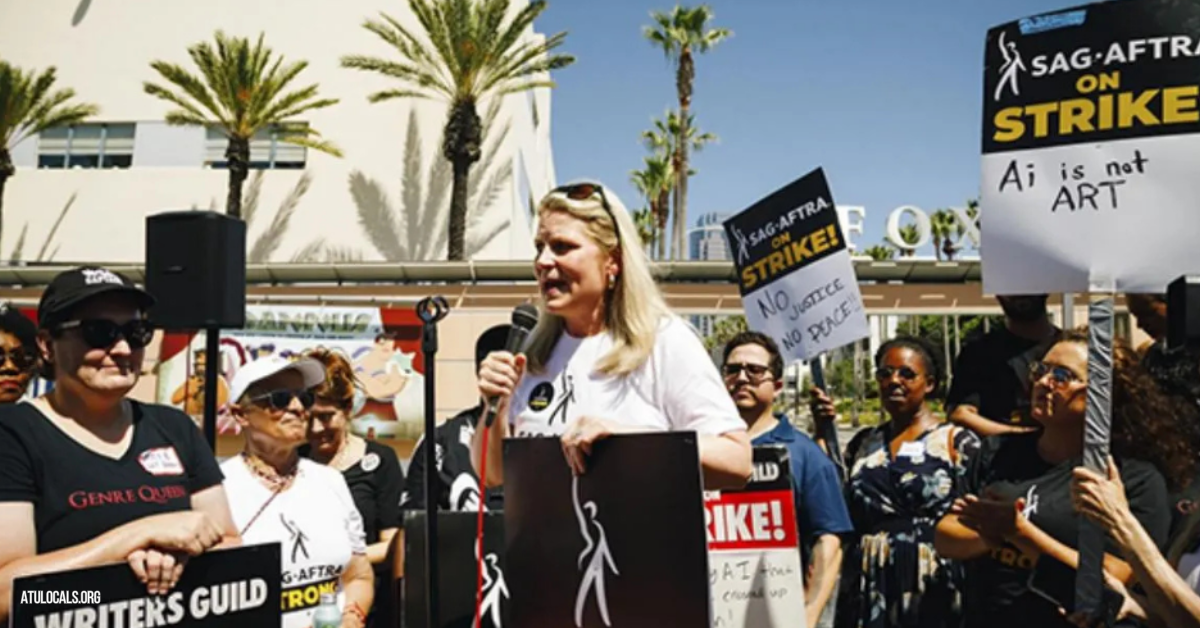NEWS ROUNDUP
Election analysis | Food banks stressed | Shutdown record
Wednesday, November 5, 2025
STRIKES
► From the Missouri Independent — Boeing receives more heat from Congress to settle St. Louis strike — Boeing’s decision to use replacement workers to complete fighter jet projects in St. Louis has once again put the company at odds with members of the U.S. Senate. Three months after union workers walked off the job on strike, five Democratic senators pilloried the plan for replacement workers as potentially putting the nation’s military at risk. “For existing projects, such as the F-15 Eagle and the F/A-18 Hornet, you are also unnecessarily endangering our warfighters by insisting on proceeding with an untrained and hastily recruited workforce,” says a letter the senators sent Tuesday to Boeing’s President and CEO Kelly Ortberg.
► From OPB — Portland police oversight staff on strike — The Independent Police Review workers, represented by Oregon AFSCME Local 189, argue that the city won’t commit to protecting workers’ jobs — and preventing layoffs — during the coming overhaul of the city’s police oversight system. “We’re asking for concrete language ensuring job security,” said Independent Police Review employee Gayla Jennings in a Tuesday media statement, “just a binding agreement that the experienced administrative investigators and staff at IPR will have a guaranteed option to continue to do the important work they’ve dedicated their careers to in the city’s new police oversight system.”
LOCAL

► From the Tri-City Herald — Layoffs? Furloughs? What we know about 13,000 Hanford jobs during shutdown — DOE programs are remaining staffed as long as money is available to carry over from the fiscal year that ended Sept. 30. Hanford employees told the Tri-City Herald last week that the money was expected to run out as soon as the start of this work week. But now enough money has been found to keep DOE Hanford workers on the job rather than furloughed until Nov. 13, employees are hearing.
► From RANGE Media — Spokane food banks are seeing ‘COVID levels’ of stress on services — But the magnitude of impact generated by the loss of SNAP still leaves local groups wading in uncharted waters, such as Second Harvest, a food bank and distributor that essentially serves “as a food bank for food banks” across the eastern portion of the state. Eric Williams, community partnerships director at Second Harvest, told RANGE the situation feels like “COVID levels of stress and demand without the food.”…Williams said the line last Thursday morning started 45 minutes early at Fairchild. And their mobile market in Wenatchee – which they advertised for up to 250 families – instead drew 495 families, leaving workers no choice but to turn away 70 cars. “In fact, each of those last week, I’m guessing, we’re averaging more than 50 cars at each mobile that we have to turn away,” he added.
► From KOMO — Food bank aids JBLM families with Thanksgiving meals during government shutdown –Eloise’s Cooking Pot, a food bank run by Ahndrea Blue, is stepping up to provide Thanksgiving meals for military families at Joint Base Lewis-McChord during the government shutdown. “We have to make Thanksgiving dinner happen,” said Blue, who also leads the Making a Difference Foundation. The food bank will host a grocery giveaway for 800 JBLM families, helping them prepare their own holiday meals. Blue emphasized the importance of supporting those who serve the country, saying, “There is a huge need for the people who serve our country every day for food.”
CONTRACT FIGHTS

► From Aviation A2Z — United Airlines Attendants Resume Contract Talks with New Demands — Union leaders representing flight attendants at United Airlines (UA) have returned to the bargaining table with the airline after a majority of members rejected a proposed labor agreement in July 2025. The latest discussions mark the first formal negotiations between the two sides since 71% of flight attendants voted down the previous tentative deal. Talks were held over three days last week, with both parties signaling a willingness to keep discussions going.
► From FOX 5 Vegas — Culinary union sets strike deadline for Harry Reid airport businesses — Union members went before the Clark County Commission to inform them of ongoing issues with some of the airport’s disadvantaged business enterprises. The businesses are part of a federal program that helps businesses owned by individuals facing social or economic challenges. The program is designed to discourage discrimination, but the union says these businesses are biased against their own employees. “The cooks and servers there, they’re $3 or $4 an hour behind the rest of the workers at the airport. And the latest proposal is to have no wage increases till next year. And it’s, I think, 25 cents is where we’re at as a wage increase. Not paying the proper amount for a health plan or pension plans. So those are in danger, too,” said Ted Pappageorge, secretary-treasurer of Culinary Workers Union Local 226.
NATIONAL

► From People’s World — AFL-CIO’s Shuler: Union contracts protect workers from AI threat — More than two years ago, AFL-CIO Secretary-Treasurer Fred Redmond forecast the perils of AI. He predicted it could let firms make millions of workers redundant—or unnecessary—and that society must confront that potential disruption. “The AI revolution has the potential to unleash broad-based prosperity that improves working conditions and lifts us all up. But if left unchecked, AI can increase economic inequality and undermine job security,” Redmond warned then. “An estimated 300 million jobs are at risk of automation by AI” worldwide, “including nearly half of all jobs in the United States.”
► From CNN — Live update: UPS plane crash near Louisville, Kentucky, airport, at least 9 killed, others injured — Boeing said it has offered to work with the NTSB on its investigation into the crash of a UPS cargo plane in Louisville Tuesday. The plane involved in the crash was a McDonnell Douglas MD-11F, a freight transport aircraft manufactured originally by McDonnell Douglas, a company that merged with Boeing in 1997. “Our concern is for the safety and well-being of all those affected. We stand ready to support our customer and have offered technical assistance to the NTSB,” Boeing said in a statement.
► From KUOW — Air traffic controllers warn of ‘tipping point’ as U.S. government shutdown drags on — NPR interviewed four current air traffic controllers this week, who all asked not to use their names because they’re afraid of retaliation from the FAA. They said morale was already low, even before the government shutdown, due to a longstanding staffing shortage across the system. Mandatory overtime and stagnating wages were other factors dampening morale, which has gotten even worse now that controllers are not being paid at all…Some air traffic controllers say they’ve been able to get loans from their credit unions to cover their expenses for a few paychecks, while others have been forced to take on part-time jobs. “I work with people that are working a second job at night and are just calling in sick in the morning when they can’t go to the job that doesn’t pay them because they’re too tired,” said one controller who handles approaching and departing traffic at a major U.S. airport.
► From Dollars & Sense — Wage Stagnation vs. Living Wages for U.S. Workers Today — Still worse is that wage stagnation to date under Trump follows what is now a 50-year pattern. In 1973, the average nonsupervisory employee earned $29.15 an hour (in 2024 dollars). As of 2024, that average wage was $30.13. Over the same time period, the average productivity of U.S. workers—the average value of what they produce when they show up at work—rose by 150%. If these workers had received raises every year between 1973 and 2024 just equal to their increased productivity, but not a penny more, their average hourly pay today would be $72.88 an hour.
► From the American Prospect — Despite Vow to Protect Health Care for Veterans, VA Losing Doctors and Nurses — “Our staffing in the ER is beyond dire now,” said Heather Fallon, a nurse in the emergency department at the Captain James A. Lovell Federal Health Care Center in North Chicago who had long been dreading the arrival of Sept. 30, the day the fiscal year came to an end. That was the day she says she lost two nurses—and the facility lost nine staffers in total—whose contracts ended, putting further strain on her team, which has seen an increase in patients this year.
► From Grocery Dive — 5 big numbers that highlight SNAP suspension’s impact — What is clear is that SNAP has a major impact on the grocery industry. The program’s approximately 42 million participants received about $188 each in May to spend on milk, bread, produce and other products. A significant reduction means people may have less food on their plates while grocers stand to lose out on billions of dollars in sales…SNAP consumers’ value to grocers goes well beyond the federal aid they receive. Data from Numerator shows that program participants, on average, spend more than what they receive in monthly payments, and overall spend 20% more than non-SNAP shoppers.
► From Wired — An Anarchist’s Conviction Offers a Grim Foreshadowing of Trump’s War on the ‘Left’ — Although Goonan’s case began under the Biden Administration, it offers a glimpse of the approach the Department of Justice may take in President Donald Trump’s forthcoming offensive against the “left,” formalized in late September in National Security Presidential Memorandum 7 (NSPM-7), an executive order targeting anti-fascist beliefs, opposition towards Immigrations and Customs Enforcement raids, and criticism of capitalism and Christianity as potential “indicators of terrorism.”…Along with potentially violent actors, NSPM-7 instructs federal law enforcement to scrutinize nonprofit groups and philanthropic foundations involved in funding organizations that espouse amorphous ideologies, from “support for the overthrow of the United States Government” to expressing “hostility towards those who hold traditional American views on family, religion, and morality.”
POLITICS & POLICY
Local election results can be found at these links — more political coverage below:
- Whatcom County preliminary general election results 2025 (Cascadia Daily News)
- Skagit County preliminary general election results 2025 (Cascadia Daily News)
- Yakima & Kittitas County Election Results: November 4, 2025 (KIMA TV)
- Local Election Results (KEPR, Tri-Cities)
- LIVE Election Results (KREM, Spokane)
- Spokane progressives post strong showing on Election Night as voters signal they’re receptive to taxes (Spokesman Review)
- Live, updated results for the top 2025 general election races in western Washington (KING 5)

► From the Washington Post — Five takeaways as Democrats sweep elections in New Jersey and Virginia — Republicans expected a tough political environment nationwide this year as polls showed voters souring on Trump, though some had been hopeful about springing an upset or two. Democrats focused much of their marquee campaigns on the president, spending about $18 million on general-election ads mentioning Trump in Virginia and New Jersey, while just $1.3 million of Republicans’ ads mentioned the president, according to AdImpact…One encouraging sign for Democrats: They appeared to fare far better with voters of color than they did in last year’s presidential election, when Trump won close to half of Latino voters and roughly doubled his support among Black voters to 15 percent.
► From the New York Times — Shutdown Becomes Longest in History, as Trump Officials Threaten Pain Could Worsen — Even as the government shutdown stretched into Wednesday and surpassed the record for the longest in American history, President Trump showed no interest in negotiating with Democrats. Instead, as the two sides entered their 36th day at an impasse, the administration signaled it planned to ramp up the pain. The president threatened on social media on Tuesday to deny food subsidy payments for 42 million Americans until the end of the government shutdown, in apparent defiance of a court order. (The White House press secretary later said the administration would comply with the court.)
► From Politico — Obamacare subsidy extension will need 60 votes, Thune says — Any possible extension of soon-to-expire Affordable Care Act insurance subsidies will need to get 60 votes, Senate Majority Leader John Thune said Tuesday as rank-and-file lawmakers close in on a deal that could reopen the government and pave the way for additional heath care talks. Democrats have privately floated an arrangement for the Senate to hold a vote to extend the subsidies at a simple-majority threshold rather than the 60-vote margin for most legislation. Thune rejected the idea, saying there was “no way” that would happen.
► From the Olympian — Olympia’s $20 minimum wage measure is failing in early election results — Proposition 1, the initiative to raise Olympia’s minimum wage to $20 and adopt a Workers’ Bill of Rights, was poised to fail, according to Nov. 4 preliminary results. Tuesday night’s initial tally showed 56% of voters voting “no,” and 44% voting “yes.” The vote tallies were 4,857 to 3,821. The Workers’ Bill of Rights included measures around predictive scheduling, tiers for different-sized businesses, the preference to add hours for current workers over hiring, and more.
► From the Government Executive — Employees are receiving renewed furlough notices as shutdown enters second month, this time without back pay guarantees — The government shutdown is poised to enter its second month on Saturday, meaning agencies across government on Friday once again sent furlough notices to hundreds of thousands of workers. To maintain clarity between shutdown furloughs and more permanent and planned cost-saving measures, notices are required to go out every 30 days…The new notices largely included the same boilerplate language as the originals that went out at the outset of the shutdown, those from several agencies viewed by Government Executive showed, with one notable difference: they no longer contained language assuring employees that back pay was guaranteed when the shutdown concluded
► From the Washington State Standard — Dozens of states tackle high prescription drug costs — States cannot lower drug prices directly, but they can go after different parts of the drug supply chain to try to lower patients’ out-of-pocket costs and reduce excessive spending in state-run health plans. Nearly two-thirds of the new state laws are aimed at pharmacy benefit managers — the drug middlemen who negotiate deals among the manufacturers that make the drugs, the insurers that allow the drugs to be prescribed, and the pharmacies that sell them. Several states are considering drug affordability review boards. Others have passed laws to hold manufacturers and PBMs to higher transparency standards.
TODAY’S MUST-READ
► From Cultured Magazine — Lost in Our Political Mayhem? These Politicians, Activists, Professors, and More Have a Reading Guide to Help You Through — The Strike of ’28 by Daniel Georgianna and Roberta Hazen Aaronson. Recommended by Liz Shuler, President of the American Federation of Labor and Congress of Industrial Organizations. “A few weeks ago I was in Massachusetts and a friend recommended this incredible book—a look at one of the most important strikes in labor history, a six-month textile workers’ strike in New Bedford, Massachusetts, in 1928 after mill owners announced a 10 percent wage cut. It’s a powerful reminder of what workers can accomplish when we stand together, and it couldn’t be more timely in this moment, as we stand up to unprecedented corporate greed, new technologies on the job, and fight for the dignity of all working people.”
The Stand posts links to local, national and international labor news every weekday morning. Subscribe to get daily news in your inbox.





